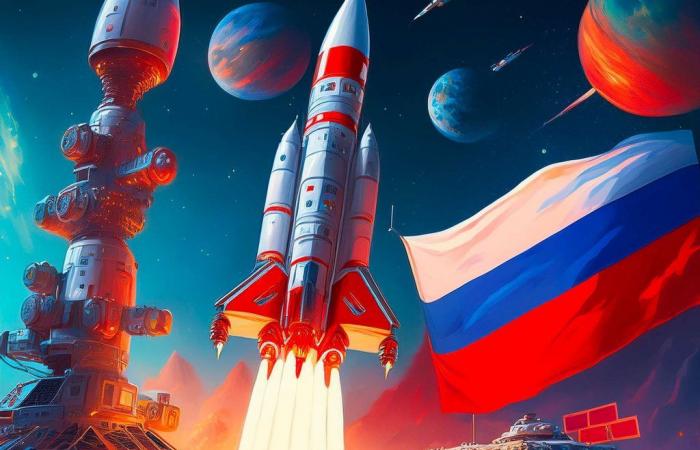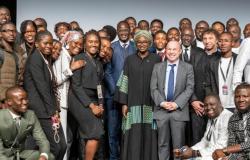The Russian-Ukrainian conflict, which had its roots in 2014 with the start of the war in Dombass as well as the annexation of Crimea and which intensified in February 2022 with the large-scale invasion of Ukraine, “ plunged the Russian space sector into uncertainty », Explains Brian Kalafatian, researcher and doctoral student in political science at the Institute for Strategy and Defense Studies (IESD). International partnerships, particularly with the West, have gradually collapsed, opening new perspectives for a ” set of powers which claim to be in opposition to the hegemony of the NATO bloc, and could also attract other developing states, particularly in Africa “. Despite economic sanctions that aim to weaken Russia’s economic base – by isolating it from critical technologies and markets, such as space, aviation and oil and refining – Russia “ maintains expertise in several technological areas deemed essential for its survival and national security », wants to clarify the researcher in geopolitics.
Abandonment of partnerships
The most harmful effects of sanctions and international isolation will be felt from mid-2022 on Russian space programs. Western countries have quickly severed all ties with the Russian space sector, putting an end to collaborations established during the Cold War and the following decades “. In Europe, the cessation of operation of the launcher SoyuzSoyuz in Guyana and the abandonment of participation in flagship programs, such as ExoMars 2022 and Luna lunar missions, bear witness to this.
Joint operation of the International Space Station currently constitutes an exception, with Russian astronauts continuing to fly aboard spacecraft. SpaceXSpaceX and American astronauts using Russian Soyuzes to reach the complexe orbitalcomplexe orbital ».
Emergence of geopolitical blocs
Today, the international dynamic is “ characterized by theemergenceemergence of two geopolitical blocs “. On the one hand, Putin’s Russia seeks to forge alliances with China, Iran, North Korea and other countries not aligned with American policies, while on the other, the European Union, the United States and the NATO countries form what we call the “West”. For these two blocks, “ the whole challenge is to rally new States “. This is what we see “ with many African countries turning to Russia or China rather than France “. In this context, space has become a “ strategic issue: it is not only about space conquests, but also the impact of space policies on terrestrial activities, such as observation, geolocation, positioning and intelligence ».
Russia’s space DNA
The space sector remains deeply rooted inADNADN of Russia, constituting a source of unity for its federated states and reflecting its common history », recalls Brian Kalafatian. For Moscow, the “ space represents a showcase of its continuity on the international scene, even at the cost of alliances with powers like China “. Despite the sanctions, Russia retains “ essential technological capabilities in areas such as access to space, observation, geolocation, intelligence, and its supply chain, although proven, continues to function », Analyzes the researcher.
“Despite sanctions, Russia retains essential technological capabilities in areas such as access to space, observation, geolocation, intelligence”
However, Russia is showing a growing desire to strengthen the place of space in its military strategy. The inadequacies identified before the Ukrainian conflict, which proved critical during the invasion of Ukraine, particularly in terms of observation and communication, still seem to persist. With the possible exception of these famous spy and maneuvering satellites, Russia would encounter difficulties in renewing and modernizing its fleet of military satellites. That said, access to reliable information on this delicate subject is very limited. Analysts and experts often rely on open sources, such as articles, reports or testimonials, which can vary in reliability. We became aware of this with difficult to verify information according to which Russia could equip itself with a space nuclear weapon to destroy satellites.
However, the “ resilienceresilience of its space sector is being tested by the need to strengthen its strategic capabilities “. Subject to bans on several Western technologies, Russia finds itself facing a major challenge: “ modernize some of its capabilities inherited from the Cold War with sovereign, even Chinese, components “. But Chinese support remains measured, because “ Beijing fears repercussions on its Western markets », Understands the researcher.
Vulnerabilities and sophisticated maneuvers
Despite these challenges, Russia, although weakened, “ demonstrates a desire to maintain its capabilities and positions itself in other segments including cyber and electronics “. His alleged maneuvers during several NATO operations “ illustrate its ability to confuse opposing operations without crossing the threshold of open confrontation “. This strategy aims to show that, even in a weak situation, Russia “ has capabilities of nuisancenuisance consequences, as well as deterrence tools, while the hypersonic question tends to gain importance. It also seems difficult not to interpret, after the fact, the anti-satellite test carried out in November 2021 as being a maneuver intended to have a dissuasive impact. ».
Future prospects and reduced lunar ambitions
In this new geopolitical context, the “ Russia’s space exploration ambitions are curbed, but not completely hampered “. The recent failures of the Luna program, ferfer spearhead of Russian space science policy, testify “ of the loss of skills and the complexity of replacing Western technologies “. His desire to settle on the LuneLune permanently is postponed until the Greek calendars and it “ is not certain that it will be able to participate in China’s lunar base project “. After its withdrawal from the Mars program ExoMarsExoMars 2022, Russia no longer has a Mars program. She keeps the program running VenusVenus of a probe intended for VenusVenus.
By 2031, the International Space StationInternational Space Station (ISS) should be desorbed, marking the end of a significant chapter of the space cooperationspace cooperation international. In this context, Russia is showing its ambition to develop its own space station. This project is part of a desire not only to maintain exploration and research capabilities in orbitorbitbut also to strengthen its autonomyautonomy spatial.
After hesitations and uncertainties which may have led to considering abandoning the space station program in 2024, or even separating the Russian segment from the orbital complex, Russia today seems to be showing renewed determination. It has apparently relaunched and accelerated its Ross space station program, the constructionconstruction could begin as early as 2028 with the launch of a first module. This station, which will not be permanently occupied, could also allow Russia to collaborate with other countries outside the framework of the ISS, seeking to establish new partnerships in the space domain. That said, despite the progress of the program, specialists remain uncertain about the viability of this project. The technical, economic and political challenges are considerable.
“The future of the Russian space sector will depend on its ability to preserve key strategic capabilities as well as tools intended to guarantee its national security, such as access to space, Earth observation and geolocation”
In conclusion, the future of the Russian space sector “ will depend on its ability to preserve key strategic capabilities as well as tools intended to guarantee its national security, such as access to space, terrestrial observation and geolocation, while strengthening its alliances with states sharing visions similar », underlines Brian Kalafatian. In this context, space cannot be considered in isolation; it is intrinsically linked to more general strategic and political issues. So, “ The future of Russian space promises to be full of challenges, but also opportunities, as the Federation attempts to reaffirm its status in a changing global environment ».
Finally, it is crucial to emphasize that a “ of Russia’s main shortcomings lies in its resilience “. Operating on limited assets, Russia “ faces potential threats to its future stability “. However, it is likely that the sanctions are not eternal and that a need for rapprochement with Russia on questions ofenergyenergy and international stability will emerge in the future », wants to believe Brian Kalafatian.






